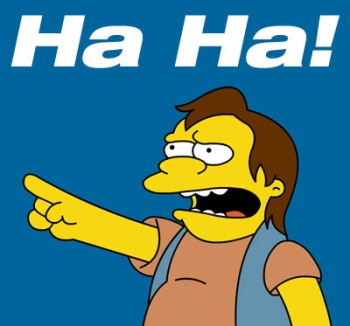(Guest post by Greg Forster)
During the mad real estate rush a couple years ago, five school districts here in Wisconsin (including the biggest district here in my county) borrowed $200 million and sunk it into some extremely unwise investments hoping to get rich quick.
Because that’s exactly why we gave the public school system the right to tax us – so it could play the market with our money.
The investments all went south and are now worthless.
But don’t panic! Fortunately, they structured the deal so that in the event they lost all their money, they could totally shaft their creditors. The investments were made by a trust they set up rather than by the districts themselves, so the districts aren’t liable for the losses. Their creditors have to eat it all.
One bank, which lent the districts $165 million, has asked the districts to try to pay at least some of it back, on grounds that they have a “moral obligation” to make the losses good even if they don’t have a legal obligation to do so.
Here, according to the Milwaukee Journal Sentinel, is the districts’ response:
The districts’ officials have argued they are protected from paying back the $165 million because the loans were undertaken by trusts rather than the districts themselves and because a moral obligation is not the same as a legal obligation.
But remember, public schools are the cornerstone of democracy because they and only they are capable of inculcating children with strong civic values like responsibility and respect for the rights of others.



I’m not sure these districts should pay if they are not legally obligated to do so. If banks gave them non-recourse loans, presumably they were aware of the risks and charged a higher rate to compensate themselves. The banks made a bad bet and lost. And to make them whole would be to transfer wealth from taxpayers to banks who were not legally owed any money. That doesn’t seem right.
Similarly, do we think it is wrong for people to stop making mortgage payments, move out, and give the keys to the bank if they have negative equity in their house? I don’t think that’s wrong. The bank knowingly made a non-recourse loan (for which they presumably charged a higher rate than a loan that required collateral of people’s personal assets as well as house) and they lost their bet.
I don’t want to use taxpayer funds to bail banks out of their bad non-recourse loans, either in housing or in schools.
Well, I think the key point here is that the schools seem to agree (even if you don’t) that they have a moral obligation to pay, yet they won’t.
Whether they do have a moral obligation to pay is not nearly as important a question as whether it’s OK for them to agree that they have a moral obligation to pay and then not pay.
Suppose I don’t think recycling is morally obligatory but my neighbor does, yet neither of us recycles. We could debate whether my failure to recycle makes me less morally fit to serve as a role model to impressionable children. But there’s no debate that my neighbor’s failure to recycle makes him less morally fit to serve as a role model to impressionable children.
That makes sense. And what are public entities doing speculating in the markets with borrowed money? There is a cost to taxpayers for doing that in that future interest rates for public borrowing will be higher.
Why would the banks agree to that? They should fire the people who approved the loan.
Well, there was a lot of that kind of thing going around during the recent bubble, as you may have noticed.
But I should put out my opinion (just for the record) that I don’t agree with Jay’s position that there’s no moral imperative to prefer paying back a loan over defaulting. That’s why they call it a “loan” rather than a futures option.